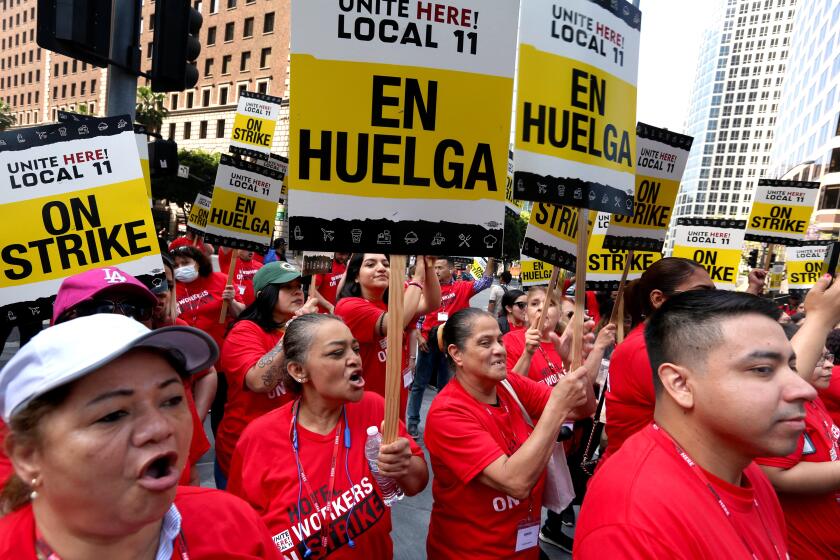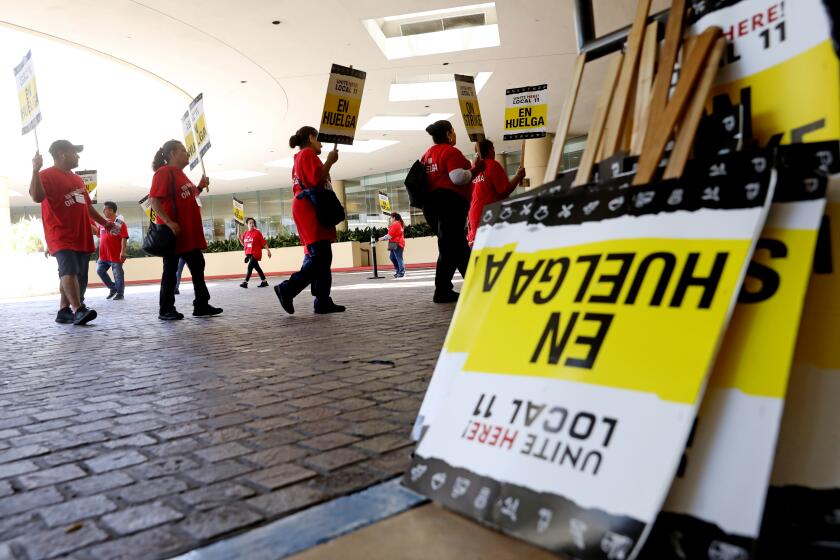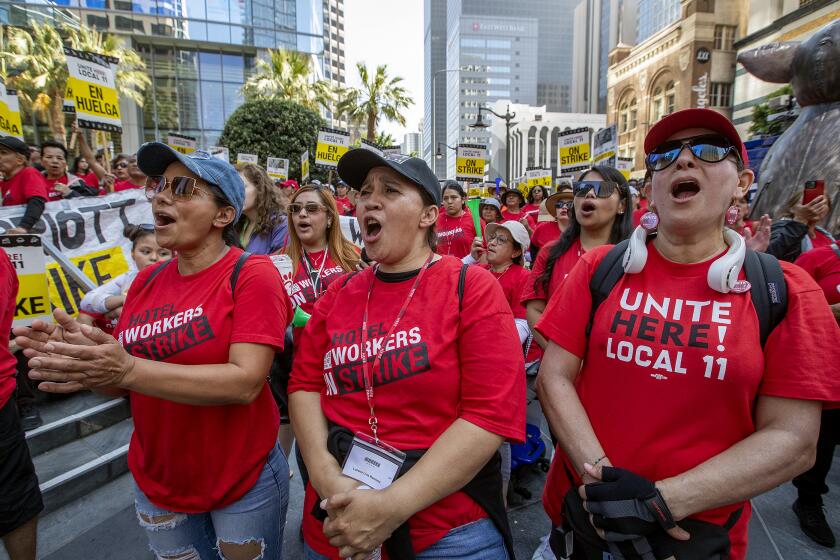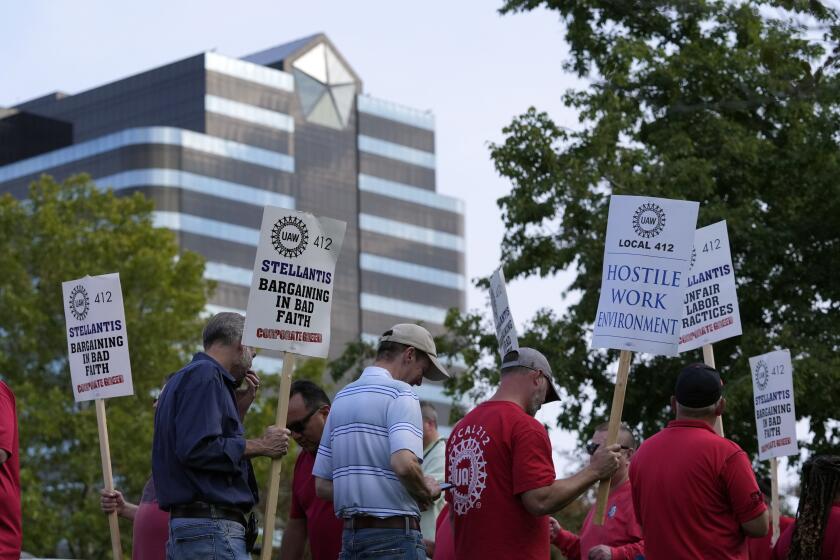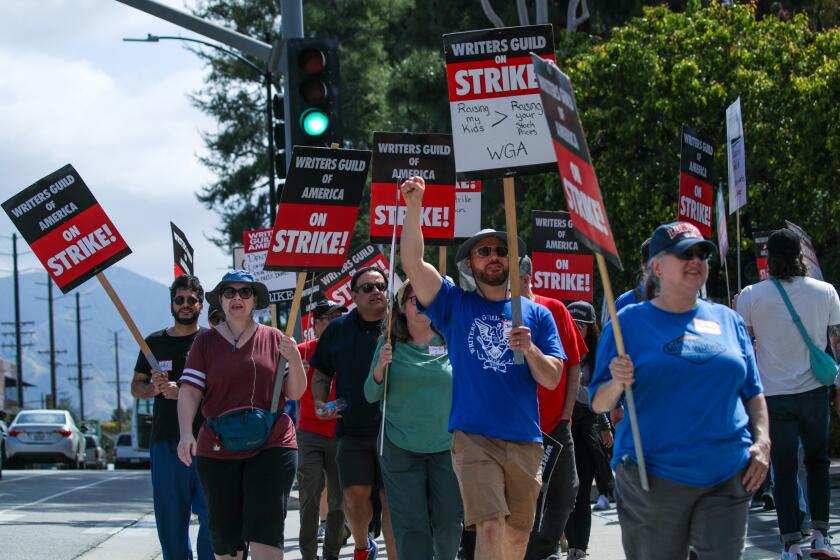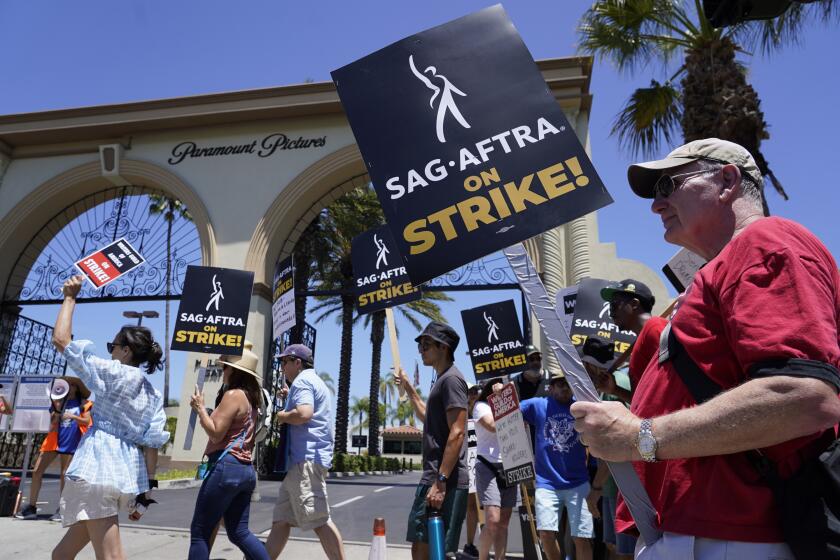Why U.S. hotels are missing more than 238,000 employees
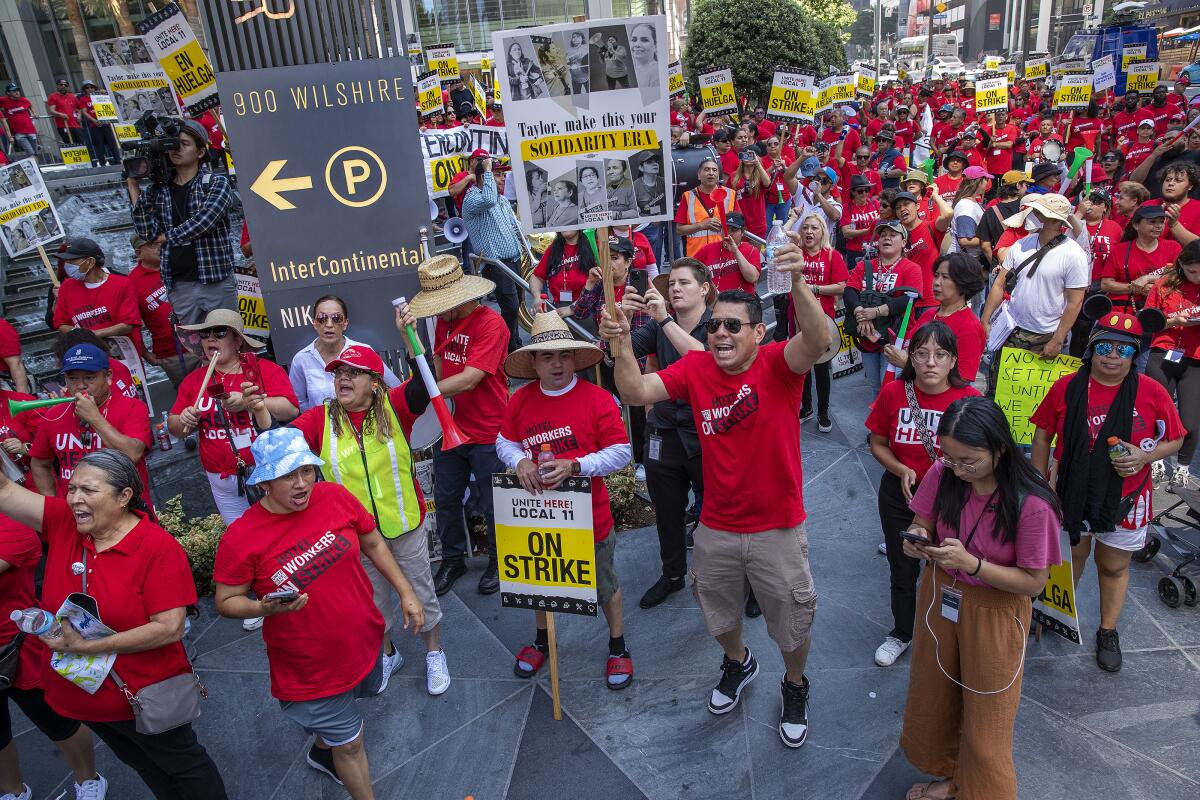
- Share via
Tourism is back in the U.S. — but hotel workers are not.
Hotels and resorts learned to operate with leaner staffing models during the pandemic. Three years later, Covid-era band-aids like self-service kiosks and less frequent housekeeping have now become the new normal for many firms seeking to cope with rising labor costs and perpetual vacancies.
While employment in a variety of industries has now surpassed 2020 levels, the accommodation industry currently employs about 238,000 fewer workers than before the health crisis — a hole that’s likely to persist.
Companies are seeing these initiatives “as a solution to the efficiency issues,” said Alexi Khajavi, president for hospitality, travel and wellness at Questex, an information services firm. But there’s “also just simply the fact that they don’t think that the labor issues are going to be fixed anytime soon.”
That’s especially true in Southern California where the hospitality sector has had to contend with a wave of rolling hotel worker strikes ever since the July 4 weekend. Contracts expired June 29 at more than 60 hotel sites where some 15,000 workers are represented by Unite Here Local 11. Union members struggling with rising housing costs in the area are asking for higher pay and better benefits.
Clocking in for picketing that began as early as 6 a.m., hotel workers expressed determination — as well as nerves.
Labor issues also have hit Las Vegas, where one in four people are employed in the leisure and hospitality sector, especially hard. The more than 17,000 shortfall of workers in the city’s accommodation industry has left the unemployment rate at 6.1% – the highest among any major metropolitan area in the country — despite job growth in other industries.
Technology is on full display across Las Vegas. Major hotels allow guests to access their rooms without much human interaction with self check-in and mobile-entry. Drink-dispensing machines are mixing up cocktails at resorts like the MGM Grand. And robots named Elvis and Priscilla are making room deliveries at Marriott International’s Renaissance.
The distrust toward new technologies and cost-saving measures could ultimately help spark the Culinary Workers Union’s first citywide strike in almost four decades. Contracts covering 40,000 union members just expired, and a strike vote is scheduled for next week.
As drink-dispensing machines have gained ground in recent years, Holly Lang, 45, has seen close to 20 bartenders look for new jobs. Starting at about $40,000, companies can get one of Smart Bar USA’s automated dispensing machines fully installed, and its employees trained to use it.
The machines can dispense drinks quickly, with the help of fewer bartenders. But Lang, a unionized server who’s been working at MGM Grand for nearly two decades, said the new technology requires her to balance more tasks. Machines can get clogged or don’t process the orders she puts in, putting her in a tough spot with customers, she said.
Hotel workers at several downtown L.A. properties walked off the job Wednesday, the latest action in a strike that began nearly two months ago.
“We’ve kind of had to take on the role of bartending even though that wasn’t something that we actually signed up for,” Lang said.
The service robotics industry is projected to reach $216 billion in 2030 as staffing shortages accelerate the need for automating processes like customer service and cleaning, according to the research company GlobalData Plc.
Smart Bar Co-Managing Member Barry Fieldman says his products weren’t developed to replace workers but to make their jobs easier instead. Bartenders can make more drinks, earning more money for themselves and the business. It’s “a win-win proposition,” he said.
Recent cyberattacks at both MGM Resorts International and Caesars Entertainment show how technological advancements can also come with new challenges. The attack disrupted MGM’s websites, its reservations and payments systems as well as some slot machines at its casinos.
Fewer Guest Services
Many hotels, however, are just providing fewer guest services, whether that’s less frequent housekeeping or reduced operating hours for the front desk, bar and pool. More than one in four hotel operators said the front office function would be phased out of their properties within the next five years, according to a recent survey.
Hotel strikers have endured violent incidents involving security personnel at three hotels in L.A. and Orange counties, the union said in a complaint.
From dockworkers to screenwriters, employees have long fought to make sure that new technologies and cost-saving practices are not introduced at the expense of their jobs. Just last week, the United Auto Workers launched an unprecedented strike against the nation’s three largest automakers. Though the pandemic warranted a new approach for hotels, worker animosity has escalated as these policies have endured.
“Companies — not just here in Vegas, but across the country — are capitalizing on the pandemic,” said Ted Pappageorge, secretary-treasurer at the culinary union. “We’re seeing these massive corporations try to eliminate labor and replace it with technology, or simply reduce services and attempt to modify the guests’ behavior to service themselves.”
Nationally, many hotels say they have been trying to increase headcount — they just haven’t had much luck. A May survey by the American Hotel & Lodging Assn. showed 82% of hotels were experiencing staffing shortages, most notably in housekeeping.
“Those are numbers we never saw prepandemic,” said AHLA President and Chief Executive Chip Rogers.
Hotels also see initiatives such as digital customer service and flexible housekeeping schedules as a way to improve the guest experience. “Technology’s not going anywhere, and I think that has been a great benefit,” Rogers said.
The United Auto Workers union expands its strikes against major automakers by walking out of dozens of locations in 20 states.
While the Culinary Workers Union’s latest contract already included protections such as free retraining when new technologies were introduced, not all hospitality workers in Las Vegas are unionized. More broadly, less than 3% of all leisure and hospitality workers nationwide were union members last year.
“If we weren’t here, Las Vegas wouldn’t exist,” said LaDonna Teeters, 59, a unionized bartender who’s spent 27 years at Park MGM. “We want to be able to go back to just having one job so that we can continue to make the guest experience that much stronger and more memorable.”
The union is a key force not only economically but also politically: It has garnered attention for its size, its door-knocking campaigns and its potential to swing key elections in the battleground state of Nevada.
For those who lost their jobs in recent years, it can be hard to find one with similar pay and skill level in the increasingly diversifying Las Vegas economy. Only one in four of the city’s adults have a college degree, and recent job creation in sectors such as healthcare and manufacturing has emphasized the skills gap.
“Those 20,000 jobs are not coming back in the way that they were prepandemic,” said Stavan Corbett, interim executive director for economic and workforce development at the College of Southern Nevada. Instead, they’re coming back in new sectors or even new job titles within hospitality.
The recent run of wins in the Legislature for organized labor was remarkable. Now Gov. Newsom must decide if union-backed bills will become law.
“A lot of those individuals potentially don’t qualify for the job they had two years ago, and did for 15, 20 years,” he said.
MGM, the largest employer in Nevada, illustrates some of the nuance of lingering staffing shortages. The company is on track for another record recruiting year after hiring more than 22,000 workers nationwide last year, but some workers don’t stay on the job for long, said Rebecca Smith, vice president of talent acquisition at MGM.
Three years after the worst of the COVID-era worker shortages, the biggest challenge is turnover in a city like Las Vegas where people come and go.
“We have hiring events weekly for housekeeping,” she said. “There’s constantly going to be turnover. So we have mass numbers that we need to fill at all times.”
Looking ahead, there is hope for a pickup in accommodation employment.
As worker actions continue from Hollywood to Detroit, the White House is highlighting its efforts to bolster worker organizing.
Customer satisfaction is oftentimes directly linked to staffing levels, and new hotels — like the one Fontainebleau is opening later this year in Las Vegas — will offer thousands of fresh job opportunities. Mark Tricano, president of Fontainebleau Las Vegas, said they’ve received over 45,000 applications for the roughly 240 positions it had posted.
“What we’re realizing now is that, structurally speaking, we are still woefully under the amount of employment we need,” said Khajavi of Questex.
Bloomberg writers Christopher Palmeri and Patrick Clark contributed to this report.
More to Read
Inside the business of entertainment
The Wide Shot brings you news, analysis and insights on everything from streaming wars to production — and what it all means for the future.
You may occasionally receive promotional content from the Los Angeles Times.
